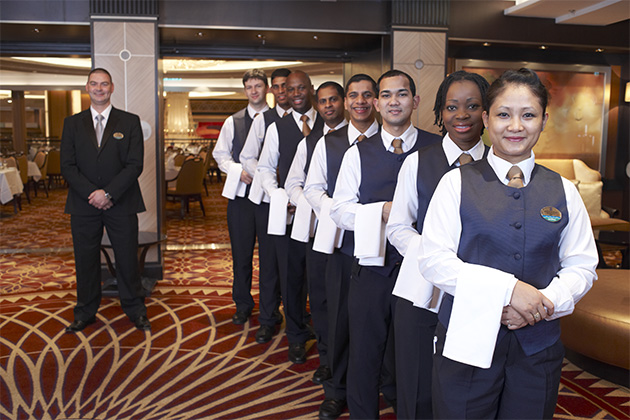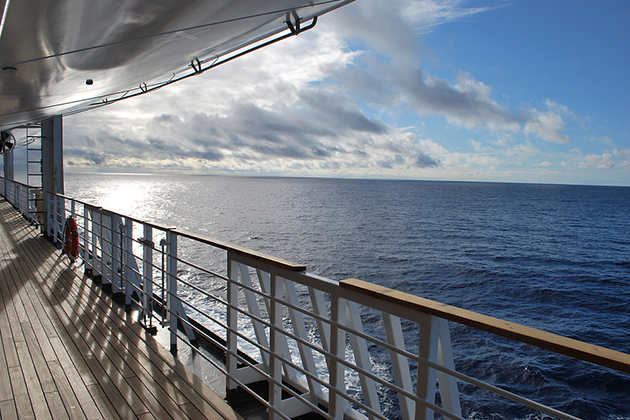How to Get a Job on a Cruise Ship
If you love cruising, you might have wondered how to get a cruise ship job. You need a miracle, right? You need to "work on water." The good news is there are a lot of jobs on offer in the cruise industry. A large ship employs thousands of crew, and the staff ratio on luxury ships can be as high as one crew member for every one or two passengers. The first step for getting a job on a cruise ship is to make a checklist of your skills and experience. Cruise ships are virtually floating hotels and therefore draw heavily from the hospitality sector. If you have a talent or have worked in restaurants, bars or hotels, this is one main way to be considered for hiring. Crew from within or from the other ships often fill some of the more specialised roles -- such as in the activities team or guest services -- but you may find a position in the day spa or gym. Cruise lines recruit through agencies, so you need to apply to the appropriate agency for initial screening and interviews. If you are a dancer or singer, be sure to have your CV up to date and perhaps a video of your work. Permanent crew positions may be headhunted from the hospitality and entertainment industries, as well as the fitness, beauty, hairdressing, and massage sectors. People from countries where the pay scale is lower -- such as Asia, Eastern Europe and South America -- usually fill the positions of restaurant waiters, housekeeping and cabin stewards. Once accepted by the agent, you will begin to receive alerts about cruise ship vacancies. These trips may be as short as a week, or several months long. The agent will charge a daily rate for the length of the cruise. They will be the intermediaries between the cruise line and yourself, and all queries, changes and negotiations will need to go through them. The terms and conditions between cruise lines vary somewhat, so you will need to find an agent such as Eventz in Paradise or Sixth Star. Entertainers are in great demand, so if you professionally dance, play an instrument, perform magic or stand-up comedy, you should speak to your agent or manager about working on a cruise. A ship's onboard entertainers are usually on long contracts and employed by the cruise line. If the idea of spending such long periods at sea is not what you want, there are still other opportunities to go aboard and 'work your passage'. Short-term positions include rabbis and priests, especially during religious holiday seasons such as Christmas, Easter, Hanukkah and Passover. Another category is those who have a skill or specialised knowledge to impart. Most cruise lines need guest lecturers to speak on 'sea days' about the upcoming ports or another topic associated with the cruise. Speakers need to be experts and may be university lecturers, teachers or travel writers. A sub-set of lecturing includes teaching leisure activities such as bridge, ballroom dancing, painting with watercolours, patchwork or scrapbooking. Some cruise lines even recruit gentlemen to partner up with the single ladies on the dance floor. Short-term appointees are not usually regarded as crew, although you may be assigned to a crew cabin. This varies between lines. Permanent crew receive a wage (often quite low by Western standards), but accommodation, food and of course the cruising are free. Depending on your role onboard, your roster might not allow much free time to leave the ship and explore each port the ship visits. Now, here's the crunch: there is generally no payment for short-term appointees. You will also be required to pay the recruitment agent a small daily fee. However you may be able bring a partner, and their cruise will be covered, and sometimes (not always), gratuities for you both will be waived, too. The two of you will enjoy the same dining and onboard privileges as paying passengers. You might even be flown to the departure port and returned home again, depending on the contract. Most shipboard contracts are for several months, which means you have some job security, but you might need to lock up your house and leave your friends and family for six or seven months, with a two-month at-home break. This varies widely between roles but the rule of thumb is that the more senior a placement, the fewer months worked before a break. There is also some degree of control over your life. While onboard, the cruise director's department will administer your role and you will work according to your assignment. Depending on your job, you may be free to go ashore to enjoy ports or join a shore excursion without paying the normal fee. In some cases there may be crew discounts on shopping, drinks or internet charges. So if you have incurably itchy feet, or sea legs, working on a cruise ship might provide a partial solution. Just don't expect it to be like one long holiday.
Know which skills are needed.

Familiarise yourself with cruise line recruitment agencies.

Consider becoming a lecturer.
Get paid.

Weigh the pros and cons.
How to Get a Job on a Cruise Ship
Source: https://www.cruisecritic.com/articles.cfm?ID=2377